Margaret Long Wisdom High School
| Margaret Long Wisdom High School | |
|---|---|
 "Fortune Favors the Brave" | |
| Location | |
|
Houston, Texas United States | |
| Coordinates | 29°43′47″N 95°30′00″W / 29.72969°N 95.49993°WCoordinates: 29°43′47″N 95°30′00″W / 29.72969°N 95.49993°W |
| Information | |
| Type | Public, Secondary |
| Established | 1962 |
| School district | Houston Independent School District |
| Principal | Jonathan Nguyen Trinh (as of 2015) |
| Grades | 9-12 District 20-5A |
| Enrollment | 1,433 (2012-2013) |
| Campus | Urban |
| Color(s) | Black & Gold |
| Mascot | Generals |
| Newspaper | The Traveler |
| Yearbook | Saber |
| Website |
schools |
 The front of the school after its 2012 renovation | |
Margaret Long Wisdom High School, formerly Robert E. Lee High School, is a publicly funded secondary school located in Southwest Houston, Texas, United States 77057. The Houston Independent School District, the 7th largest school district in the United States, operates Lee, a public admission school that enrolls grades 9 through 12 (ages 14–19). The school serves the neighborhoods of Uptown, Briargrove, Westchase, and Gulfton areas of the city of Houston. Houston Independent School District will submit construction documents in 2016-2017 school year. After the construction documents are submitted, They will vote to seek approval for the new school.
The school is named after teacher Margaret Long "Tiny" Wisdom (born October 2, 1922).[1]
History
Early history
Lee High School was officially Lee Senior High School, named after Robert E. Lee and opened in 1962 to relieve high attendance at Lamar and Bellaire high schools.[2] Lee's first principal, Woodrow Watts, was previously the principal of Lamar. After its opening Lee became Lamar's primary athletic rival.[3] At that time, Lee High School had a white and mostly affluent and suburban student body.[2]
For its first twenty five years, Robert E. Lee High School built a comprehensive suburban high school, drawing students primarily from Afton Oaks, Tanglewood, Briargrove, Briarcroft/Briarmeadow, and Rivercrest/Briargrove Park/Walnut Bend neighborhoods, all south of Buffalo Bayou. It has been home to multiple award winning students and faculty, service clubs and programs, athletic teams and graduates over its 50-year history. The school's motto is "Fortune Favors the Brave", taken from the Lee family and based on the Roman philosopher Virgil's quote.
The United Daughters of the Confederacy's Robert E. Lee chapter number 186 supported the school in its early years; it donated portraits of Lee, gave American Civil War-related books to the library, and gave the school a rebel flag. The school's symbol is the Lee family coat of arms, which has a squirrel on the top holding a nut.[4]
The Lee campus was the subject of a 1974 "60 Minutes" story on drug culture in American High Schools. It was expanded significantly by HISD to address overcrowding two times in its first 25 years; first in 1967, and again in 1987.
Post-1980s
As times changed, the demographic of Lee's student body shifted. As of 2008, it was made up predominantly of Hispanic immigrants and sons and daughters of Hispanic immigrants.[5] Lee's multi-ethnic population changes parallel Houston's immigration waves, beginning with the Vietnamese families in the early 1980s. With the change in apartment housing rules in the 1980s, both the community and the school population changed. The demographic of Lee's student body shifted significantly in the 1990s, as students from the south zone (Gulfton area) who are a majority Mexican and Central American immigrants and/or sons and daughters of Hispanic immigrants became the overwhelming majority of the student body. Lee became one of the largest 5A high schools in the region by the late 1990s.
Stacey Childress, author of Transforming Public Education: Cases in Education Entrepreneurship, wrote that in the mid-1990s Lee "was one of Houston's most feared schools" due to the surrounding area having one of the highest rates of juvenile crime in the state and due to being the school with the lowest rate of English fluency in Houston.[6]
Lee's student body was relieved of about 1,000 students when Westside High School, about 7 miles (11 km) west of Lee, opened in 2000, removing the last significant numbers of middle-class students and non-Hispanic White students.[5] When Westside opened, residents of the Lee attendance boundary gained the option to attend Westside instead of Lee.
Around 2000 the school stopped using the "Robert E." part of the same, and its logo became that of a four-point, star-bodied person. Steve Amstutz, the principal, said around that year "People think we stole it from Cingular." The school removed its portraits of Robert E. Lee.[4] The star in the logo juggles ten balls, representing ten learning communities established around that year to provide personalized education to students. The establishment of the learning communities was part of a $68 million HISD initiative to personalize and improve high schools throughout the district; this reflected a national trend of personalizing education in high schools.[5]
Newcomer Charter High School (as of 2007, known as Liberty High School) was opened in January 2005 and housed in Lee High School. In 2006 it was scheduled to move into a new campus at 6400 Southwest Freeway (U.S. Highway 59).[7]
According to the Houston Independent School District October 2006 "For Your Information" newsletter, Lee was one of four high schools that took the most refugees from Hurricane Katrina.
In the 2005-2006 school year, HISD was required to provide free tutoring to low income students at Lee because for three consecutive years, Lee did not meet academic targets, which were set by the federal No Child Left Behind act. During the school year, 2,912 students at Lee, Marshall Middle School, and Kay On-Going Education Center qualified for the tutoring. The tutoring, which covered the Texas Assessment of Knowledge and Skills (TAKS), began on February 4, 2006. On the three campuses, 74 students, 3% of the eligible students, enrolled in the tutoring program. Mercedes Alejandro of the group Parents for Public Schools accused HISD of not effectively communicating that the tutoring was available to the communities at the schools.[8]
In 2007, a study by Johns Hopkins University and the Associated Press referred to Lee among American high schools designated as "dropout factories", where at least 40% of the entering freshman class does not make it to their senior year.[9]
YES Prep Lee, a charter middle school, was located inside the Lee High School campus; the school planned to expand to a six through 12 campus with 30 classrooms.[10] In the summer of 2007 the school was established on the third floor of Lee High School. YES paid $65,000 annually to lease the space. YES intended to grow its school to around 700 students. YES and charter officials wanted state officials to pass a bill allowing schools occupying the same campus to share test scores; the bill failed.[11]
In 2008 Bill Gates and Melinda Gates visited Lee and the YES Prep school inside Lee.[12]
In December 2009, YES Prep moved all of the around 400 students in the Lee program off of the Lee campus. In January 2010 the board of YES Prep voted to terminate its partnership with Lee High School.[11] YES Prep Lee, now YES Prep Gulfton, is no longer located inside Lee High School.[13]
In 2010, Amstutz stopped being the principal of Lee. HISD did not state whether his departure was voluntary or involuntary.[14] Amstutz continued to be an employee of HISD.[15] Paul Castro from Westside High School was transferred to become the new principal of Lee High School.[16] He resigned after three months.[17] In April 2010 Terry Grier, the superintendent, announced that he had an improvement plan for Lee.[18] Xochitl Rodriguez-Davila was promoted from HISD's Stonewall Jackson Middle School leader to become Robert E. Lee's 18th principal (its 14th since 1990) in July 2010. During that summer Newsweek ranked Lee HS among the "America's Best High Schools" list.[19]
The HISD board voted to give the school its current name in 2016.[20]
The school was featured on Anthony Bourdain: Parts Unknown, and principal Trinh gave an interview on that show.[21]
Facility

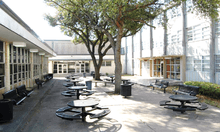
In 2010 Lisa Falkenberg said "The Lee of today, with its crumbling façade and graffiti on nearby buildings, is far from the glistening school on the prairie that opened in 1962 to relieve overcrowding at prestigious Lamar High."[22] As of 2010, one of the brick façades outside one of the entrances had bricks missing. Lisa Falkenberg of the Houston Chronicle said that it was "left to gape like a toothless mouth for the past eight years."[23] After Xochitl Rodriguez-Davila was hired as the Lee principal, she arranged a campus facelift.[24]
During that year, HISD reported that two distinct portions of the 49-year-old main school building's foundation are sinking into the ground at different rates.[25]
Although. ever since the 2012 Bond Proposition was passed Lee is one of the first campuses that will receive a new school building in the next 2–3 years as soon as 2016. Due to this event many of the conflicts Lee High School has faced will be relieved just like the establishment of Westside High School in 2000.
Student body

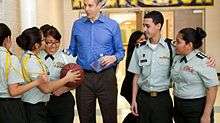
Houston Robert E. Lee High School had 1,891 students during the 2010-11 school year.[26] They are drawn largely from its attendance zone, which borders include Bellaire Blvd., Gessner Road, Buffalo Bayou and IH 610 West. There are a smaller percentage of magnet students drawn from multiple other zones within the HISD boundaries. The ethnic diversity break down of the 2010-11 student body is:
- 5% White American
- 8% Asian American
- 73+% Hispanic American
- 13% African American
- About 1% are Native American.
In 2010-11, Lee qualifies as a US Department of Education Title I campus: thus, 76% of the student body qualifies for free or reduced breakfast and lunch under federal poverty guidelines. As of 2015 96% of the students are classified as low income.[27]
In the 1960s and 1970s,[5] Lee's student body consisted of affluent White Americans. Principal Steve Amstutz stated in 2003 that Lee's student body was "a sea of white faces. They all looked like me."[4] As the school matured, the demographics of the students changed.[5] By the 1999 Lee was very overcrowded, so many students had to use air conditioning units as chairs. Around that time period, half of a given 9th grade class would no longer be present in the class once it became a 12th grade class. Around 1999, students fought in the hallways daily.[5] The opening of Westside High School in 2000 removed the last significant numbers of White and upper income students, causing the school to refocus itself to cater to its new population.[5]
In 2010 Harvin Moore, Lee's HISD school board trustee, said "There is no high school in Houston that has a more unique and difficult challenge with respect to a significant portion of the children who attend there," citing the concentration of older, immigrant students who come from third world countries and often lack basic education.[16] Monica Rhor of the Houston Chronicle wrote that in 2015 many of Lee's students "are coping with problems at home."[27] The school provides a weekend lunch program to give students meals on days when school does not operate.[27]
National origins and languages
In a 2003 article by the Houston Press, Amstutz stated, referring to the "Hispanic" designation, "But that covers from Nuevo Laredo to Tierra del Fuego. We're from the top of Mexico to the south of Argentina. And I've got kids from everywhere in between." [4] Amstutz said in a 2002 article that "Sometimes I can lose a whole country in a day, other times I can gain one."[28] Lisa Falkenberg said in 2010 that Lee was a school "Where being Rwandan isn't 'weird'".[29]
As of 2010 over 40 languages were spoken by the Lee High School student body, and the number of English language learners, over 700, was higher than the populations of some other peer high schools in the area.[17] As of that year, half of the HISD students zoned to Lee did not attend that school.[30]
Student dress and school uniform
Lee High School requires students to wear a school uniform.[31]
- Seniors wear yellow shirts and sophomores wear grey, junior wear maroon freshman wear forest green, solid "Polo style" 2-button knit shirts.
- All students wear khaki pants, shorts, or skirts.
Students have the option of wearing a university/college T-shirt or a Lee HS club shirt (only) on Fridays. Additionally, at the end of each month, seniors can opt to dress professionally on a designated day.
Some teachers who worked at Lee after the student population became mostly Hispanic recalled that some members of gangs who were enrolled at Lee openly wore gang colors and other gang insignia while on campus.[5]
Student discipline
Around 1990, according to Strong Families Strong Schools: Building Community Partnerships for Learning, the school had a "serious gang problem".[32] The school adopted a "zero tolerance for gangs" policy. A committee of ten people, including Houston Police Department security guards, HISD administrators, and administrators and teachers at Lee identified possible gang members and evicted any who were identified as violent. A group of administrators and teachers also worked to properly identify gang members and avoid misidentifying a student who would participate in a gang due to alienation if they are misidentified. In addition, the City of Houston established a school day curfew with fines for parents of children truant from school.[32] The Texas Assessment of Academic Skills (TAAS) scores of Lee, which was still considered "low-performing" by the Texas Education Agency in 1993, had increased over a three-year period ending around 1994.[32] Strong Families Strong Schools: Building Community Partnerships for Learning argued that the TAAS score increase is evidence that "things are turning around" and "The climate of the school has changed dramatically".[32]
Now Lee High School begins to start changing policies in the past couple years, their rating has met AYP Status, and Has increased to acceptable rating, the school now has four principals per grade level like many other schools, and is improving its system to meet it with other high schools, it has changed many things and is now showing significant improvement.
Academic environment
In 2010 Lisa Falkenberg of the Houston Chronicle said of Lee: "Lee High School isn't your typical failing school. In one campus, its students seem to personify every major socio-economic problem and demographic challenge facing urban schools today. At the same time, it's a petri dish for academic innovation, full of Stand and Deliver-type successes."[17] During that year she also said "The school is flailing in a test-driven accountability system blind to extenuating circumstances like poverty, pregnancy, 30 percent student turnover, and 780 students out of 1,850 considered "English language learners.""[22] Lee High School U.S. Army(JROTC) program has re-emerged as a force, improving from 24th to 7th place, out of the 25 HISD Army based student programs. Successful, statewide award winning distributive teaching programs in Metal-fabrication and Woodworking have been built in recent years, as well.
In 2010, Lee had improved its state mandated TAKS test scores significantly, yet was named academically "unacceptable" by the TEA, due to its 30% dropout rate. As a result of 3+ years of this designation, it became one of the HISD "Apollo 20" laboratory schools. It was subject to the Texas Education Agency (TEA) "turnaround" model for reforming schools in jeopardy of closing, including replacing the administration and much of the existing faculty.[16] As of 2010 the think tank "Children at Risk" ranked Lee as one of the most improved high schools in Greater Houston.[33] As of 2015 the STAAR exam failure rate at Lee was about 70%.[27]
When Lee began as a high school, all of its foreign language activities occurred in the "Language Lab" area.[23]
As of now the Lee High School has a drop-out rate of <1% less than any other comprehensive high school in HISD, and Lee is also a subject to 100% of Seniors Acceptanced to a 2 or 4 year university or college.
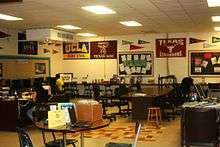
AP/Magnet Program
Lee High School administers an advanced placement curriculum, where high performing students take college level classes while in high school and earn college level credits. The number of students taking AP courses and exams has increased dramatically since the AP Program was re-introduced at Lee. A March 2009 Houston Chronicle article stated that the student body took approximately 550 AP tests; eight times the number taken in 2004.[34] In June 2010, Newsweek magazine ranked Lee #151 out of over 16,000 schools nationwide, acknowledging it among "America's Best High Schools" for its number of students taking AP tests. Jason Spencer of the Houston Chronicle called the ranking a "head scratcher," since prior to the announcement of the ranking the HISD administration had forced 160 teachers at Lee and other schools to leave due to low performance. Thompson explained that the ranking system, which divides all of the AP exams taken by the total number of students, is "freakishly simplistic" since it does not take into account performance during the AP exams. The ranking done by the think tank "Children at Risk" that year placed Lee in number 133 out of 140 high schools.[19] Responding to the Newsweek ranking, HISD superintendent Terry Grier said "The efforts at Lee High School to encourage more students to take college-level courses are to be commended. We must raise the level of achievement for all students, and it is for this reason that we will be initiating the Apollo 20 project at Lee in the next school year. We will continue to build on the work you and your colleagues have done so that we can ensure that every child in our school district receives a quality education that will prepare him or her for college and career success."[35]
There are a number of advanced, college prep Advanced Placement courses taught at Lee, including:
AP World History
AP U.S. History
AP U.S. Government & Politics
AP Macroeconomics
AP English Language
AP English Literature
AP Calculus AB
AP Calculus BC
AP Chemistry
AP Statistics
AP Studio Art
AP Spanish Language
AP Spanish Literature
AP French Language
AP Biology
AP Environmental Science
AP Physics B
In May 2010, 300 students signed up to take approximately 800 AP tests, with increases in exemplary scores in AP US Government, AP Macroeconomics, and AP Calculus across the board.
The school is divided into 4 academies, paralleling grades 9-12, each managed by an assistant principal. There is an additional academy for non-English speaking students and 9th graders in need of ESL or additional math or English tutoring.
Electives, clubs and organizations
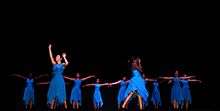
There are a steadily growing number of electives, student clubs and organizations at Lee. Some of these include,
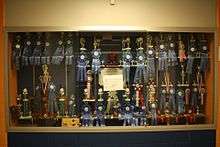
For electives:
- Lee Guard Dance Team
- Theatre Arts
- Theatre Production
- Guitar Instruction
- Band
- Human Services
- US Army/ JROTC
For extracurriculars and student clubs:
- National Honor Society
- Debate Team- Houston Area Forensics
- Anime Club
- Academic Decathlon
- Media/Lee TV
- Modern Music Club
- The Welding Club
- The Interact Club
- The Arab Club
- The Nepali Club
- The Woods Project
- Young Life
In 2011 Lee began to offer a class in Band and Guitar Instruction again.
From 1962-2000, Lee had student service organizations, including Pilot Club for Women's Anchor Club, Galleria Area Rotary Club's "Interact," and Kiwanis Club's Key Club. Marla Morrow, a former student quoted in Education Week, said that prospective members of the Key Club were required to reproduce the financial statements of their parents.[5] As of 2011, Galleria Rotary Club is working with both Robert E. Lee and Lamar High Schools to re-organize and sponsor Interact student service clubs at each campus.
The Lee Mighty Rebel Band will perform in the 2015 Rose Parade in Pasadena, California on New Year's Day.[36]
Athletics
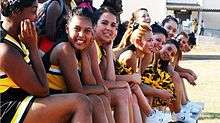
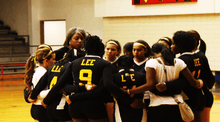
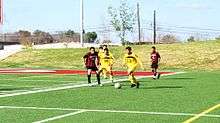
Robert E. Lee HS currently plays a full complement of UIL girls and boys varsity sports in District 21-4A, along with HISD's Waltrip, Davis, Yates, Sharpstown, Reagan, & Austin High Schools. Lee has alternated as a 4A and 5A school throughout its 50-year history, playing in 19-4A, 18-4A,17-4A,18-5A, 21-5A, and the current 20-5A district. It plays Men's varsity soccer in UIL District 20-5A, where it is the 2011 District Champions.
Robert E. Lee Varsity sports teams include:
- Baseball (club)
- Basketball (Girls)
- Basketball (Boys)
- Cross Country (Girls)
- Cross Country (Boys)
- Varsity Cheerleading (Girls)
- JV Cheerleading (Girls)
- Varsity Football (Boys)
- JV Football (Boys)
- Dance/ Drill
- Track & Field (Co-ed)
- Varsity Volleyball (Girls)
- JV Volleyball
- Wrestling (Boys)
- Soccer (Girls)
- Soccer (Boys)
- Softball (Girls)
- Swimming (Co-ed)
In previous eras the school used a statue called "Uncle Bob," a depiction of Robert E. Lee, as a mascot.[37]
In previous eras the primary athletic rival was Lamar High School.[38] American football games were the primary outlet of this rivalry, but it manifested itself in other ways; in 1975 Gregory Curtis of the Texas Monthly wrote that "the respective Key Clubs know year by year which club has sold more grapefruit in the Christmas drive and more tickets to the spring Pancake Breakfast."[37] According to Curtis, the rivalry "is as natural as it is intense" because the schools had students from the same social class and general geographic area.[39]
American football team
From the 1960s to the 1980s, Lee High School's American football team often appeared in high school playoffs. Many famous football players and coaches were involved in the program. Of the seven most recent inductees to the Texas High School Football Hall of Fame as of August 24, 2010, two were involved with Lee High School. Joe Clemens, a famous football coach, coached at Lee in the 1960s. Peter Gardere, a former University of Texas at Austin quarterback, played for Lee in the 1980s. The significance of American football at Lee decreased when the student demographics changed.[40]
The opening of Westside High School, which decreased the number of students at Lee from 3,100 to 2,100, drained most of the American football players from the school and the school did not have enough children who were interested in playing American football.[5] In 2003 the school dropped American football from its sports program; This is likely because American football is not a popular sport in the home countries of its largely Hispanic student body.[5] Steve Amstutz, the principal, said that he did not receive complaints after the team was cut.[41] After 2003 soccer (football) became the main sport at Lee High School. Soccer is played at Lee's homecoming games instead of football.[42] In 2010, some alumni visiting the school expressed shock when they found out that football was not a sport at Lee. The school no longer had its historical American football trophies.[23] Around 1995, the principal at Lee had virtually all of its athletic and academic trophies thrown out, leaving the cases empty.
In February 2010 the school administration decided to re-establish American football as a school sport.[40] As of May 2010 plans to re-establish American football were ongoing.[23] The school administration assembled the football team from scratch. As of August 2010 the players originated from countries in Africa, Canada, Guatemala, Mexico, and other countries. The team had some Muslim players.[40] In 2010, the R.E. Lee Alumni Association worked with the school and district, and established a partnership with the Houston Texans Football Team, to help re-establish a permanent football program. In accordance with UIL rules, LEE will field a JV football squad for 2010 and 2011, returning to 21-4A Varsity District play in Fall, 2012.
Golf team
Lee High School's home green was the Sharpstown Golf Course, a municipal golf course in Sharpstown, Greater Sharpstown, Houston located about 4 miles (6.4 km) from Lee.[43]
The Lee High School girls' golf team existed in the 1970s. When the demographics of the school shifted, the golf team ended. Around the time that American football was cut, the school revived its boys' and girls' golf teams.[4] As of 2003 six boys and four girls played golf for Lee; one of the ten was caucasian.[4] Steve Amstutz, the principal, explained that Lee founded the team to teach students how to learn to commit to a goal and to give them an activity that would keep them involved and attending school.[44]
As of 2003 the Lee golf team had relatively little experience with the game compared to other area teams. In 2002 Lee's golf team was ranked last in a golf competition, with none of the players selected to continue forward in the competition.[41] The players did not like to be ranked first, because the best player would compete against other district golf teams. The teams of Bellaire and Lamar high schools had more experienced players, and many of them had played with golf professionals. During that year Ryan Rhodes, the coach, said "It really is frustrating for the guys and girls to go out there and compete against somebody who's been playing a lot longer and has a lot better grasp of the game."[41] Amstutz said that the team was not as well performing as other teams, because the team had been recently established.[44] As of 2011 Lee no longer offers golf.[45]
Parent-teacher organization
When Westside HS opened in 2000, most of the infrastructure and active parents transferred their allegiance and PTO assets to the new school. As a result, since 2000, Lee does not have a parent-teacher organization.[22]
Alumni and alumni organizations
As of 2010 Lee was coordinating an alumni database with Harris Publishing and has an on campus alumni liaison group. Almost all of the inquiries that former Lee principal Steve Amstutz received from Lee alumni (2000–2009) asked for information on when school reunions would occur. Lisa Falkenberg of the Houston Chronicle said in 2010 that when she writes about Lee, she receives responses from Lee alumni. She said that some e-mails criticize illegal immigration, holding it responsible for Lee High School's decline. She received some complaints about Lee no longer using the name "Robert E. Lee."[22]
After Falkenberg aired her 2010 column about former principal Paul Castro leaving the school after three months, she received messages from school alumni who stated that they intended to help Lee. 1965 Lee graduate Martin Bailey requested for volunteers to assist the school. Two alumni, Tom Behrman, and John Carloss, began discussing possibilities of charitable activity with the school administration, including donating to the Lee NEXT STEP Fund, a nonprofit fund that places Lee students in career and university preparatory programs; mentoring; and holding speaking events.[22]
In April 2010 a group of alumni who intended to start an alumni organization organized a tour of the school. One alum in the tour, Joe Berwick, reported that he enjoyed meeting the students. Another, Behrman, expressed disappointment towards the deteriorated condition of the physical plant. After the Lee tour, the involved alumni proceeded to award two $5,000 scholarships to Lee students.[23] An editorial in the Houston Chronicle praised the alumni for supporting their school.[46] Three Lee alumni, Behrman, Melanie Hauser, and Richard Spence, founded the Robert E. Lee High School Alumni Association to reconnect alumni with their alma mater and provide additional, ongoing assistance for Lee High School and to help it improve its community relations.[47] The Robert E. Lee Alumni Association hosted a 50th Birthday, "Gray & Gold JubiLEE" All School Reunion in October 2012, where alumni from all 50 graduating classes convened to celebrate and recognize 50 years of Generals history.
Neighborhoods served
The school district zones a large area of west/southwest Houston outside of the 610 Loop to Lee.[48]
A significant number of Lee's students now come from the Gulfton community, a group of apartment complexes housing recent immigrants.[5] Other areas zoned to Lee include Uptown Houston, St. George Place (Lamar Terrace), Larchmont, Briargrove,[49] Shenandoah,[50] Tanglewood, Tanglewilde, Briar Meadow, Briarcroft, Woodlake, West Oaks, Jeanetta, the Houston ISD portions of Piney Point Village and Hunters Creek Village, Sharpstown Country Club Estates, and small portions of Westchase east of Gessner Road.
Lee High School served all areas within the Westside attendance boundary until its 2000 opening, including Walnut Bend, Briargrove Park, and Rivercrest.[51] The pre-2000 Lee attendance zone bordered City of Bellaire, the communities of Alief and Spring Branch, and Greater Katy.[52]
Even though several wealthier neighborhoods such as Tanglewood and Briargrove are primarily zoned to Wisdom, As of 2010 parents there prefer to send their children to Lamar, Westside, private high schools, or charter high schools.[53]
Transportation
Houston ISD provides school buses for students who live more than 2 miles (3.2 km) away from the school or who have major obstacles between their houses and the school. Students are eligible if they are zoned to Lee or are in the Lee magnet program. A METRO bus stop is located beside the school's entrance.
Feeder patterns
Elementary schools that feed into Lee[48] include:
(portions)
Middle schools that feed into Lee include:
- Grady[64]
Partial:
All pupils zoned to Pilgrim K-8 are zoned to Lee.[68][69]
All pupils zoned to Long and Pershing Middle Schools may attend Pin Oak Middle School.[70] Accordingly, Pin Oak also feeds into Lee High School.
Students of the Briargrove, Emerson, Pilgrim, and Piney Point elementary attendance zones may also attend Briarmeadow Charter School, so that school feeds into Lee.
Notable alumni
- Andy Fickman (film and stage director and screenwriter) - 1982
- Jeff Filgo (television producer and screenwriter) - 1985[72]
- Peter Gardere (American football player and member of the Texas High School Football Hall of Fame)[40][73] - 1988[72]
- Billy Gibbons (member of ZZ Top) - 1968[72]
- Edward Gonzalez (Houston City Council member) - 1987[72]
- Richard Dowling (concert pianist) - 1981[72]
- Mike Quinn (American football player)[74]
- Robert K. Ritner (professor of Egyptology at Oriental Institute of the University of Chicago) - 1971[72]
- John P. White (actor) - 1991[72]
- Nabeel Sattar (Pharmacist) - 2011
Notable faculty
- Gil Bartosh (football coach, former Texas El Paso head coach, and member, Texas High School Football Hall of Fame)
See also
References
- Strong Families Strong Schools: Building Community Partnerships for Learning. DIANE Publishing Company. July 1, 1994. ISBN 078811980X, 9780788119804.
Notes
- ↑ "Who Was Margaret Long Wisdom?" Words of Wisdom, Wisdom High School Student News. Retrieved on August 28, 2016.
- 1 2 "Lee High School Where the World Comes To Learn," Northwest Regional Educational Laboratory
- ↑ Curtis, Gregory. "Pomp and Circumstance" (Archive). Texas Monthly. Vol. 3, No. 3. Emmis Communications, March 1975. ISSN 0148-7736. p. 54.
- 1 2 3 4 5 6 Grossman, Wendy. "Tee Time." Houston Press. November 13, 2003. 1. Retrieved on March 4, 2010.
- 1 2 3 4 5 6 7 8 9 10 11 12 Viadero, Debra. "Personal Touches" (Archive). Education Week. June 16, 2004. Retrieved on March 4, 2010. Available on EBSCOHost.
- ↑ Childress, Stacey. Transforming Public Education: Cases in Education Entrepreneurship. Harvard Education Press, March 30, 2010. ISBN 1934742430, 9781934742433. p. 16 (View #2 - See search page/Search page #2). "[...]summer of 1995 to prepare for their school openings.[...]Lee High was one of Houston's most feared schools. The school had the highest ratio of English-deficient students of any school in the city, and its zip code had one of the worst juvenile crime profiles in Texas."
- ↑ "Students at HISD’s Newcomer Charter School Make History. Houston Independent School District. September 27, 2006. Retrieved on December 8, 2011.
- ↑ Radcliffe, Jennifer. "Few HISD students sign up for tutors." Houston Chronicle. Tuesday February 21, 2006. Retrieved on December 8, 2011.
- ↑ "Report points to 'dropout factories'," Houston Chronicle, October 31, 2007
- ↑ Radcliffe, Jennifer. "YES PREP PROGRAM / Unveiling a unique education alliance / Up to 130 charter school 6th-graders will attend classes at HISD's Lee High School campus this fall" (). Houston Chronicle. Thursday July 12, 2007. B1 MetFront. Retrieved on March 8, 2010.
- 1 2 Radcliffe, Jennifer. "Yes Prep, Lee High School part ways." Houston Chronicle. January 16, 2010. Retrieved on October 19, 2010.
- ↑ Mellon, Ericka. "Bill Gates' secret trip to Houston." Houston Chronicle. November 14, 2008. Retrieved on February 5, 2011.
- ↑ "YES Prep Lee." YES Prep Public Schools. Retrieved on March 8, 2010.
- ↑ Mellon, Ericka. "New Lee High School principal leaving for KIPP." Houston Chronicle. March 31, 2010. Retrieved on February 5, 2011.
- ↑ Connelly, Richard. "Latest Principal Shifts In HISD Bring Grumbling." Houston Press. Wednesday January 27, 2010. Retrieved on September 8, 2011.
- 1 2 3 Radcliffe, Jennifer. "The two faces of Lee High." (Archive) Houston Chronicle. February 8, 2010. Retrieved on March 3, 2010.
- 1 2 3 Falkenberg, Lisa. "Falkenberg: Why did Paul Castro decide to leave Lee?." Houston Chronicle. April 6, 2010. Retrieved on April 7, 2010.
- ↑ Mellon, Ericka. "HISD sets improvement plan for troubled schools." Houston Chronicle. April 14, 2010. Retrieved on February 6, 2011.
- 1 2 Spencer, Jason. "Newsweek ranks Houston ISD's Lee among nation's elite." Houston Chronicle. June 14, 2010. Retrieved on June 16, 2010.
- ↑ Clemons, Tracy. "HISD approves name changes for seven schools" (Archive). KTRK-TV. Thursday May 12, 2016. Retrieved on May 21, 2016.
- ↑ "Wisdom High School featured on CNN’s “Parts Unknown” with Anthony Bourdain." Student News Site of Wisdom High School. October 27, 2016. Retrieved on November 3, 2016.
- 1 2 3 4 5 Falkenberg, Lisa. "Lee alums not ready to give up." Houston Chronicle. April 14, 2010. Retrieved on February 6, 2011.
- 1 2 3 4 5 Falkenberg, Lisa. "Lee alumni reach across the decades." Houston Chronicle. May 3, 2010. Retrieved on May 4, 2010.
- ↑ Baird, Annette. "Principal ready to change perception." Houston Chronicle. August 22, 2010. Retrieved on February 7, 2011.
- ↑ Connelly, Richard. "Lee High School Is Sinking!!" Houston Press. Thursday July 15, 2010. Retrieved on July 16, 2010.
- ↑ "Lee High School Profile." Houston Independent School District. Retrieved on August 31, 2011.
- 1 2 3 4 Rhor, Monica. "Immigrants from around the world are transforming Houston." Houston Chronicle. March 5, 2015. Updated March 7, 2015. Retrieved on March 8, 2015. "Seven out of 10 Lee students failed the STAAR English test; 96 percent are economically disadvantaged. Many are coping with problems at home." and "The difference might be in something as essential as the school's backpack program, which provides students with two days of meals on weekends,[...]"
- ↑ Downing, Margaret. "Wake-Up Call." Houston Press. November 28, 2002. 2.
- ↑ Falkenberg, Lisa. "Lee alums not ready to give up." Houston Chronicle. April 14, 2010. Retrieved on February 5, 2011.
- ↑ Mellon, Ericka. "HISD faces politically tough choices in closing schools." Houston Chronicle. December 20, 2010. Retrieved on February 22, 2014.
- ↑ "School Information." Lee High School. Retrieved on December 20, 2010.
- 1 2 3 4 Strong Families Strong Schools: Building Community Partnerships for Learning, p. 14.
- ↑ "Which Houston schools have made the grade? See the top 10." KHOU. April 26, 2010. Retrieved on February 5, 2011.
- ↑ Radcliffe, Jennifer. "Lee High’s struggles fade with college-credit success." Houston Chronicle. March 12, 2009. Retrieved on March 12, 2009.
- ↑ Mellon, Ericka. "Grier responds to Newsweek naming Lee High School among the best." Houston Chronicle. June 16, 2010. Retrieved on February 5, 2011.
- ↑ Meredith Moriak, Lee band selected to perform in 2015 Rose Parade, Mywesttexas.com, September 14, 2013
- 1 2 Curtis, Gregory. "Pomp and Circumstance" (Archive). Texas Monthly. Vol. 3, No. 3. Emmis Communications, March 1975. ISSN 0148-7736. p. 56.
- ↑ Curtis, Gregory. "Pomp and Circumstance" (Archive). Texas Monthly. Vol. 3, No. 3. Emmis Communications, March 1975. ISSN 0148-7736. p. 54.
- ↑ Curtis, Gregory. "Pomp and Circumstance" (Archive). Texas Monthly. Vol. 3, No. 3. Emmis Communications, March 1975. ISSN 0148-7736. p. 54-56.
- 1 2 3 4 Dial. Jenny. "Lee tackles building 'team out of thin air'." Houston Chronicle. August 24, 2010. Retrieved on February 5, 2011.
- 1 2 3 Grossman, Wendy. "Tee Time." Houston Press. November 13, 2003. 2. Retrieved on February 5, 2011.
- ↑ Falkenberg, Lisa. "FÚTBOL, NOT FOOTBALL." Houston Chronicle. February 15, 2010. Retrieved on March 4, 2010.
- ↑ Grossman, Wendy. "Tee Time." Houston Press. November 13, 2003. 3. Retrieved on February 5, 2011.
- 1 2 Grossman, Wendy. "Tee Time." Houston Press. November 13, 2003. 4. Retrieved on February 6, 2011.
- ↑ "Athletics." Lee High School. Retrieved on August 31, 2011.
- ↑ "Editorial: High on Lee." Houston Chronicle, August 30, 2010. Retrieved on February 6, 2011.
- ↑ Hauser, Melanie, Richard Spence, and Tom Behrman. "Lee's return to football marks school's turning point." (Editorial) Houston Chronicle. August 28, 2010. 1. Retrieved on February 6, 2011.
- 1 2 "Lee High School Attendance Zone Archived February 3, 2007, at the Wayback Machine.." Houston Independent School District.
- ↑ "Briargrove Subdivision." Briargrove Property Owners, Inc. Accessed September 24, 2008.
- ↑ "NeighborhoodWithSubdivisionsMarked.pdf (Composite map). Harris County Appraisal District. Accessed October 6, 2008.
- ↑ "High Schools." Houston Independent School District. April 13, 2002. Retrieved on May 6, 2009.
- ↑ Home Page as of May 9, 2005. Lee High School.
- ↑ Melanie Hauser; Richard Spence; Tom Berman (2010-08-29). "Lee High's return to football marks school's turning point". Houston Chronicle. Retrieved 2016-11-17.
- ↑ "Briargrove Elementary Attendance Zone Archived March 20, 2009, at the Wayback Machine.." Houston Independent School District.
- ↑ "Benavidez Elementary Attendance Zone." Houston Independent School District.
- ↑ "Piney Point Elementary Attendance Zone Archived August 14, 2011, at the Wayback Machine.." Houston Independent School District.
- ↑ "Rodriguez Elementary Attendance Zone." Houston Independent School District.
- ↑ "Braeburn Elementary Attendance Zone Archived February 16, 2008, at the Wayback Machine.." Houston Independent School District.
- ↑ "Condit Elementary Attendance Zone Archived June 30, 2007, at the Wayback Machine.." Houston Independent School District.
- ↑ "Cunningham Elementary Attendance Zone Archived February 16, 2008, at the Wayback Machine.." Houston Independent School District.
- ↑ "Emerson Elementary Attendance Zone Archived August 14, 2011, at the Wayback Machine.." Houston Independent School District.
- ↑ "St. George Place Elementary Attendance Zone." Houston Independent School District.
- ↑ "Sutton Elementary Attendance Zone Archived February 9, 2012, at the Wayback Machine.." Houston Independent School District.
- ↑ "Grady Middle Attendance Zone Archived March 20, 2009, at the Wayback Machine.." Houston Independent School District.
- ↑ "Long Middle Attendance Zone Archived April 9, 2014, at the Wayback Machine.." Houston Independent School District.
- ↑ "Pershing Middle Attendance Zone Archived April 11, 2008, at the Wayback Machine.." Houston Independent School District.
- ↑ "Revere Middle Attendance Zone Archived February 27, 2009, at the Wayback Machine.." Houston Independent School District.
- ↑ "Pilgrim 2007-2008." Houston Independent School District. Retrieved on August 9, 2011.
- ↑ "Pilgrim Elementary Attendance Zone." Houston Independent School District. Retrieved on August 9, 2011.
- ↑ "Pin Oak Middle School." The Southwest District. Houston Independent School District.
- ↑ Distinguished HISD Alumni Archived May 15, 2012, at the Wayback Machine.," Houston Independent School District. Retrieved on November 11, 2011.
- 1 2 3 4 5 6 7 "Distinguished HISD Alumni Archived May 15, 2012, at the Wayback Machine.," Houston Independent School District. Retrieved on November 11, 2011.
- ↑ Cherry, Brice. "Peter Gardere inducted into the Texas HSHOF." Waco Tribune-Herald. May 1, 2010. Retrieved on February 7, 2011.
- ↑ Brown, Chip. "TEXANS SIDELINE." The Dallas Morning News. September 4, 2002. Retrieved on February 5, 2011. "Mike Quinn: A product of Robert E. Lee High School in Houston and Stephen F. Austin,"
External links
| Wikimedia Commons has media related to Margaret Long Wisdom High School. |
- Margaret Long Wisdom High School
- Lee High School's official website (Archive)
- Robert E. Lee Alumni Association Website
- Report on Houston High Schools by WhatKidsCanDo
- Lee Next Step Fund
- Letters from Lee
- Former Lee football coach Joe Clements in Texas HSHOF—May 3, 2010
- Peter Gardere inducted into the Texas HSHOF, May 1, 2010